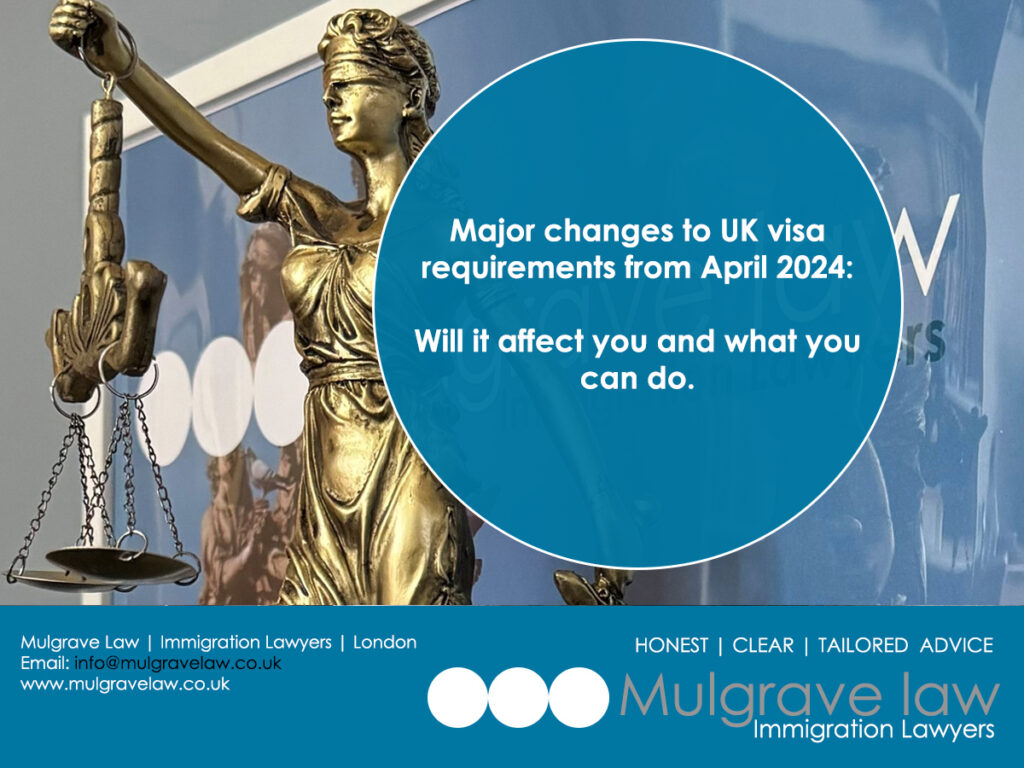Last year, the UK government announced a series of changes to its immigration rules. These changes, described as a “five-point plan” to reduce immigration, are set to take effect from spring 2024. This will affect not only businesses but also private individuals. Let’s take a comprehensive look at some of these changes and their potential impact.
Skilled Worker Visa salary requirement:
On 4 April 2024, the minimum salary threshold for a Skilled Worker visa will rise from £26,200 to £38,700 per annum. This substantial increase is likely to pose challenges for businesses seeking to sponsor skilled workers.
Health and care workers will be exempt from meeting the higher salary threshold.
The exemption of health and care workers from the new salary threshold for the Skilled Worker visa is primarily to meet the staffing needs of the NHS and the care sector. These sectors heavily rely on overseas workers, and the exemption is designed to ensure that they can continue to attract and retain the necessary workforce.
The Home Office have also confirmed that education workers on national pay scales will be exempt from the new salary threshold.
Individuals who currently have a Skilled worker visa or apply before 4 April 2024 will be assessed under the current threshold and will not be required to meet the higher threshold when they extend their leave, change employer or apply for settlement. The Home Office will, however, expect their salary to progress at the same rate as resident workers when they next make an application to extend their stay, change employment or settle.
Family Visa income requirement:
On 11 April 2024, the minimum income threshold for Partner visas will increase from £18,600 to £29,000. The threshold will be further increased and by early 2025, the amount will increase to £38,700. This increase will make it more difficult for Partners of British citizens and those with settled status, to join them in the UK.
Individuals on the 5-year Partner route will continue to be assessed under the current requirement of £18,600 when they apply to extend or settle in the UK.
Similarly, those who apply before 11 April 2024 will be required to meet the current requirement of £18,600 instead of the higher threshold of £29,000.
Dependants of care workers:
From 11 March 2024, care workers (including senior care workers) will no longer be able to bring their partner or children with them to the UK.
Care workers already in the Health and Care Worker route will be able to remain with their dependants, including extending, changing employer and settlement.
Where a care worker is in the UK before the rules change, but has not yet brought their dependants, they will be allowed to bring their dependants during their visa.
Shortage Occupation list:
In early April, the shortage occupation list will be replaced with an Immigration salary list.
The 20% going salary rate discount for roles on the shortage occupations will be removed.
This change could have a significant impact on sectors that rely on overseas workers for roles that are currently on the shortage occupation list.
Graduate Visa review:
The Migration Advisory Committee will review the Graduate visa, a two-year unsponsored work permit for overseas graduates of British universities. The outcome of this review could potentially affect the ability of overseas students to stay and work in the UK after their studies.
The changes are likely to have a significant impact on various sectors. For instance, jobs like butchers or chefs, where pay tends to be less than £30,000, are likely to affected by the increase in the minimum salary requirement for the Skilled Worker visa. This could potentially lead to a shortage of workers in these roles, affecting the operations of businesses in these sectors.
The ban on dependants for care workers could potentially exacerbate staff shortages in the care sector. Care workers play a crucial role in the UK’s health and care sectors, and the inability to bring their families could deter potential care workers from coming to the UK.
The importance of seeking legal advice and submitting your application before these changes take form:
The changes to the UK’s visa rules represent a significant shift in the country’s immigration policy. While they aim to reduce net migration, they could also have far-reaching implications for businesses and individuals. As these changes take effect, it will be crucial to stay informed and seek professional legal advice when necessary. It might be worth submitting applications before these changes take place!
It’s important to seek advice from experienced immigration lawyers and if you’re looking for assistance, consider reaching out to Mulgrave Law, one of the best immigration law firms in London.
We offer a range of services including advising private individuals to corporate immigration services, sponsorship licence guidance for employers, and advice on sponsoring migrant workers. Whether you’re searching for immigration solicitors near you or a local immigration lawyer in London, Mulgrave Law is a trusted choice for immigration services in London.
We provide Corporate Immigration Services London or Business Immigration Lawyers London at very attractive consultation charges.
Also, contact us for sponsorship licence for employers London or Sponsoring migrant workers London at very attractive consultation charges.
Get in touch with Mulgrave Law for Business Immigration Solicitors London providing services at genuine pricing.
